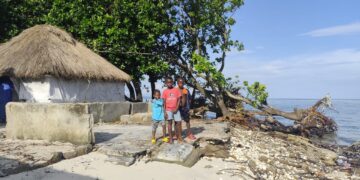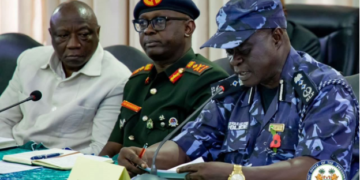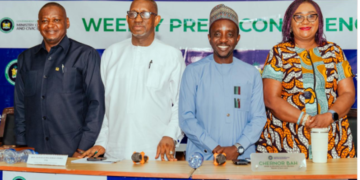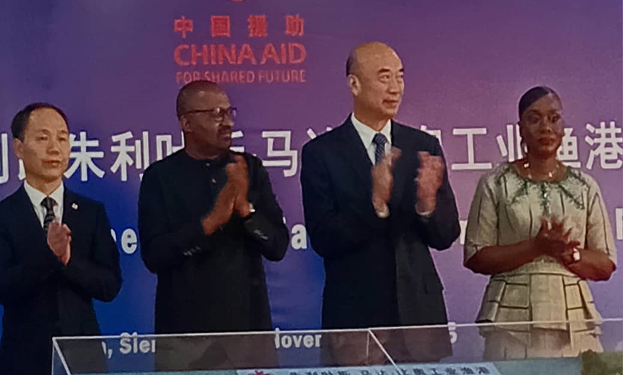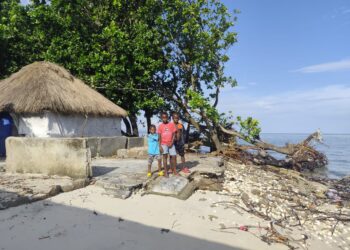The much-talked-about and long-awaited proposed $55 million US dollar Chinese-funded Fish Harbour Project has been officially launched at the Bintumani Conference Centre in Freetown, signalling the commencement of work at the project site in Black Johnson Community, Western Area Rural District.
Organised by the Ministry of Fisheries and Marine Resources in collaboration with the Chinese Embassy in Freetown, the epoch-making programme attracted a galaxy of distinguished personalities, including the vice presidents of the People’s Republic of China and Sierra Leone, government ministers, the Ministry of Fisheries and stakeholders in the fisheries sector.
Dubbed the Julius Maada Bio Fishing Port, the strategic national investment is expected to increase revenue by over US$59 million annually, create jobs across the fisheries value chain, support food security, promote the Feed Salone agenda and strengthen marine resource governance, among others.
Speaking at the ceremony, Sierra Leone’s Vice President, Dr Mohamed Juldeh Jalloh, thanked the Chinese government for cementing the existing cordial relationship between Sierra Leone and China by granting US$55 million for the construction of a modern fish harbour.
The project, he said, will help Sierra Leone meet her international obligations, including the establishment of a fishing port under the FAO Port State Measures.
Outlining the economic benefits of the project, Dr Juldeh said the project will provide an opportunity for the country to unlock wealth from the fisheries sector by providing a platform to facilitate a better monitoring and enforcement quota management system and facilitate other port-based services, among others.
The Vice President, who described the programme as a significant milestone in the history of Sierra Leone, dubbed the harbour Julius Maada Bio Industrial Fishing Port in recognition of the exemplary role he played in transforming the fisheries sector.
He thanked the attendees for gracing the occasion and called on the private sector to invest more in the industry.
Minister of Fisheries and Marine Resources Princess Dugba, while thanking the Chinese government for the gesture, intimated that the government has endeavoured to meet its obligations prior to commencement of the project, including the acquisition of 252-acre of land for the harbour and payment of compensations to deserving landowners.
In addition to the Break Water System and Slipway, the project she added will provide facilities such as Fish Market, Office for the ministry, and opportunities for private sector investments.
She expressed delight over the arrival of the Chinese Engineers and Contractors, currently working with local contractors to ensure basic amenities such as energy and water are provided before the project kicks off.
Madam Dugba noted the sector’s enormous potential and ability to support the Feed Salone Agenda and appealed for more support.
The Vice President of China Liu Gouzhong said he was very much delightful to be part of the auspicious ceremony and extended warm felicitations to Sierra Leone for the opportunity.
In furtherance of the cordial bilateral relation between the two countries, Mr. Gouzhong revealed that for decades, China and Sierra Leone have cooperated in various areas of development, including fisheries, agriculture, and education.
The Chinese Vice Premier recalled that the project was willingly approved by Chinese President, Sierra Jing Ping, following the Beijing Africa/ China Summit which culminated into the signing of a Framework on the economic partnership agreement between both cooperation countries on fisheries cooperation.
He assured that the fish harbour project will further strengthen the existing mutual trust and cordial relationship between the two countries as well as promote the development of the fisheries sector.
He pledged his scountry’s continued contribution to the development of Sierra Leone.
Permanent Secretary of the Ministry of Fisheries, Brima Kebbie, who chaired the programme, thanked China for sharing development opportunities with Sierra Leone and described the ceremony as a historic moment and symbol of the strategic partnership between the two countries.


